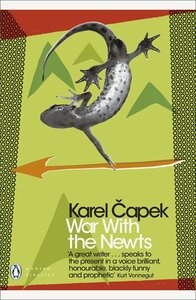Stu at Winston’s Dad is hosting a Czech Lit Month this September. It’s not an area I know very well, so I have picked out a few books to read this month, using this list from Radio Prague International as inspiration.
I’ll be working through my choices in chronological order, starting with Karel Čapek’s 1936 novel War with the Newts (I read the 1937 translation by M. and R. Weatherall, published in Penguin Modern Classics). It begins with one Captain van Toch discovering a colony of intelligent salamanders, whom he teaches to use knives to open oysters, before establishing a pearl trade with them.
This grows into the mass exploitation by humans of the Newts, as the salamanders become known. They are encouraged to spread around the world, they pick up human languages, and are put to the work that humans would prefer not to do themselves. But this situation can’t last, and eventually the Newts turn against the human population…
War with the Newts is a novel that constantly changes shape. It starts off drily humorous, lampooning groups from journalists to Hollywood stars. Its middle section covers the development of Newt civilisation, incorporating fictitious texts of various styles (such as newspaper articles and scientific accounts). Then a more serious tone comes to the fore as the war of the title begins.
What I find particularly intriguing about Čapek’s novel is that (in my reading, anyway) the Newts can’t be reduced to a single metaphor or interpretation. There are reflections of slavery, Nazism, mistreatment of animals, capitalism, environmental degradation… Above all, though, there’s a message (still urgent now) about the consequences of our actions. In the final chapter, the author of what we’ve read debates the ending with his inner voice:
“Do you think through my will that human continents are failing to bits, do you think that I wanted this to happen? It is simply the logic of events; as if I could intervene.”
With irony, even the writer can’t face up to his own complicity. There’s power in this book, and I won’t forget it easily.

Recent Comments